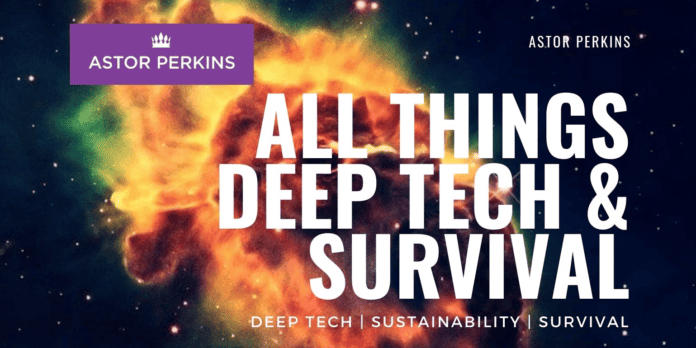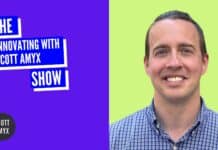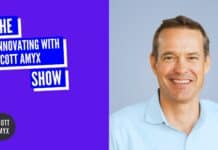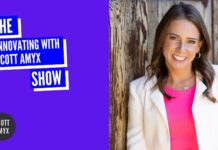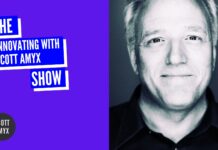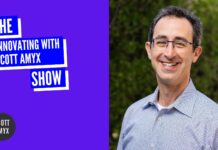Astor Perkins opening welcome by Scott Amyx, Managing Partner at Astor Perkins.
At Astor Perkins, we back mavericks solving some of the hardest problems facing humanity on Earth and in space.
The purpose of Astor Perkins’ event series is to showcase category leaders in deep tech but we do it in a way that’s distinctively Astor Perkins — with substance, rigor and trust.
Trust is a rarity in these volatile and uncertain times.
At Astor Perkins, we go beyond the due diligence of most VCs. We get into forensics. Most startup founders don’t start out to defraud investors. It happens over time. It’s looking for small clues and nascent behavior that could indicate a potential problem or a legal matter down the road.
It’s not simply a matter of financial auditing. It’s trying to piece together the flow of money. What are they hiding?
It’s looking for behaviors of secrecy, obfuscation, ethical lapses, lack of governance and controls and a potential toxic culture.
We see it as our duty to our LPs to not only deliver solid fund performance but to invest in sound, well-governed startups that have the best chance of becoming the next trillion-dollar company.
As part of that mandate, we believe in providing net new knowledge that you can trust. We don’t want our LPs to fall prey to hype or the latest exuberance of the day.
We carefully curate content with foremost experts to show you the truth on the ground. What’s really happening? What has real legs? And where exactly is it in the adoption curve?
Also, a part of prudent investing is having foresight: what’s coming down the pipeline that you need to be aware of?
At Astor Perkins, everything that we do supports our mandate of trust, substance and rigor.
In today’s exciting program, you will hear from Professor Matthew Gilliham, Director of the Waite Research Institute at the University of Adelaide and Director of the Australian Research Council Centre of Excellence in Plants for Space who will share a new exciting program that will fund research to study plants in space.
The Center represents an international authority and focal point for plant-based space food, material, and engineering research. It will create new technologies and capabilities in plant modification to translate research into applications to address grand challenges in sustainability for Space and on Earth.
With eyes towards delivering transformative solutions for Space habitation – to create enhanced plant-derived food and bioresources. It’s an ambitious research and international coordination with NASA and international space agencies, private space companies to top research and universities such as Cambridge, UC Berkeley, and ETH Zurich, to name a few.
The Center has been endowed with a $35M budget over 7 years to pursue this ambitious goal.
In the field of longevity, we look across tissue/organ growth and transplantation, gene editing, and gene therapy, senescence cells, cellular engineering, epigenetic programming, and organ regeneration.
One of the areas that we look at is the importance of our gut health to longevity.
The human intestinal microbiome consists of a dynamic multispecies community of billions of bacteria. Research has revealed that the intestinal microbiome plays a critical role in our immune system which is responsible for fighting everything from cancer to other diseases.
Dr. Barbara Sladek, Managing Director at Biome Diagnostics will discuss how they are using machine learning and next-gen DNA sequencing to understand an individual’s unique health characteristics of their gut microbiome.
This startup is working to help optimize our gut health at the individual level as we age over time.
Their diagnostics can help predict how well a patient would respond to cancer therapy in terms of the strength of their immune system.
While mainstream can’t seem to get past the hype and frenzy of large language models, at Astor Perkins, we are examining the advancements in machine learning models and techniques that are driving fundamental innovation under the hood.
Professor Daniela Rus, Director of MIT CSAIL and Director of MIT-AF AI Accelerator will speak on liquid neural networks.
She will explain how closed-form continuous-time neural networks can help acquire knowledge by synthesizing flexible neural models that can perform inference model-free. These liquid time-constant networks can improve:
- representation learning
- robustness and flexibility of models
- Capture true causality of data
- models’ interpretability,
- All the while, making systems more efficient and scalable
Professor Steven Wofsy of Atmospheric and Environmental Science at Harvard will discuss satellite detection of global methane emissions.
MethaneSAT, funded by the Environmental Defense Fund, a non-profit, is building a satellite that will provide data to catalyze action to rapidly slow the rate of global warming. It aims to measure methane emitted by oil and gas infrastructure, urban environments and agriculture at a level of precision and on a fine scale never achieved before. The goal of the MethaneSAT project is to reduce methane emissions from the oil and gas industry by 45% by 2025 and nearly eliminate methane emissions by 2050.
MethaneSAT is a single satellite with a wide field of view and a high-precision instrument
capable of mapping and quantifying methane emissions in about 200 km or 125 miles in area.
What sets MethaneSAT apart from other satellites detecting methane is its ability to measure plumes or the diffused methane that other satellites cannot detect yet represents some 80% of methane emissions.
Most of us have recently watched SpaceX Starship’s first-ever fully stacked test flight.
The panel with Dr. Abhishek Tripathi, Director of Mission Operation at UC Berkeley Space Sciences Laboratory and Dr. Andy Lapsa, CEO of Stoke Space will discuss the implication of SpaceX’s Starship on the competitive landscape and even on other space industries such as satellite refueling and servicing, private space stations, the cislunar economy and lunar ice and mineral mining on the Moon.
We then transition to space debris removal with Luc Piguet, CEO of ClearSpace.
Referred to as the Kessler Syndrome, it’s a phenomenon in which the amount of space junk in orbit around Earth reaches a point where it creates more space debris, causing safety and operational challenges for satellites and space missions.
In 2020, ClearSpace won an ESA contract worth $100 million to develop and conduct the world’s first orbital debris removal mission named ClearSpace-1.
They have since designed a four-armed capture system for its robotic satellite, passing the PoC testing with ESA last year and now qualified to proceed to the next phase. They hope to launch their system in 2026.
We then explore truth on the ground with robotics with some of the foremost experts and leaders in robotics.
- Dr. Dave Coleman, CEO of PickNik Robotics
- Jordan Kretchmer, CEO of Rapid Robotics
- Dr. Wes-ley Zheng, CEO of Posh Robotics
They will share their experience and perspectives on the adoption of robotics in manufacturing & industrial applications.
And finally, while investors have long understood how policies and special interest lobbying can boost or protect investments, not many have explored the role of activism in the context of investments.
We are joined by Nick Engelfried, Activist & Author and Ilana Cohen, Youth Climate Activist at Harvard to discuss the role of climate activism on legislation and capital.
So I hope that you are as excited as we are about today’s incredible agenda and speakers.
Astor Perkins presents a unique opportunity. Come see us at work.
Welcome to Astor Perkins All Things Deep Tech & Survival!
Register for the next Astor Perkins Quarterly Event.
Subscribe to “Innovating with Scott Amyx” on Amazon Alexa and YouTube
****MORE EXCLUSIVE Content on Instagram:****
Innovating with Scott Amyx: https://www.instagram.com/scott_amyx/
►Subscribe for MORE videos & podcasts!
https://www.youtube.com/channel/UCNnVp5hGUCRoY-XpPDoGPMA
Website: https://scottamyx.com/
YouTube: https://www.youtube.com/channel/UCNnVp5hGUCRoY-XpPDoGPMA
Amazon Alexa: https://www.amazon.com/Scott-Amyx-Innovating-with/dp/B07VKR8Y9F/
RadioPublic: https://radiopublic.com/innovating-with-scott-amyx-G1Jvql
Stitcher: https://app.stitcher.com/browse/feed/449394/details
Apple/iTunes: https://podcasts.apple.com/us/podcast/innovating-with-scott-amyx/id1474687903
Google Podcast: https://podcasts.google.com/?feed=aHR0cHM6Ly9pbm5vdmF0aW5nLmxpYnN5bi5jb20vcnNz
Google Music Play: https://play.google.com/music/m/Ilttjfvxbxgeotovkybddixvsau?t=Innovating_with_Scott_Amyx
TuneIn: https://tunein.com/podcasts/Business–Economics-Podcasts/Innovating-with-Scott-Amyx-p1236824/
Podbean: https://www.podbean.com/podcast-detail/bf4yt-9ad13/Innovating-with-Scott-Amyx-Podcast
Player.FM: https://player.fm/series/2527138
Spreaker: https://www.spreaker.com/show/3639855
Blubrry: https://www.blubrry.com/innovatingwithscottamyx/
★↓FOLLOW ME ON SOCIAL MEDIA!↓★
Website: https://scottamyx.com/
LinkedIn: https://www.linkedin.com/in/scottamyx/
Instagram: https://www.instagram.com/scott_amyx/
Twitter: https://twitter.com/ScottSAmyx
TikTok: http://vm.tiktok.com/81Je3r/


